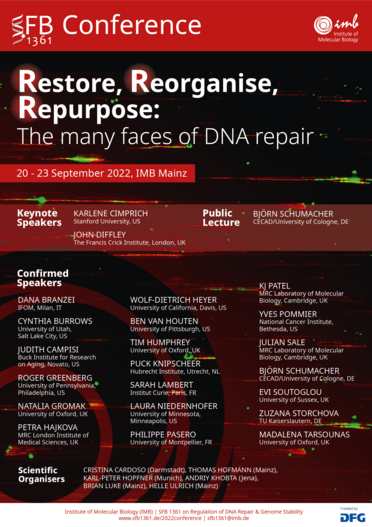IMB/SFB 1361 Conference - Restore, Reorganise, Repurpose: The many faces of DNA repair
20 – 23 September 2022 at IMB in Mainz, Germany
DNA repair and damage response pathways provide essential defensive measures against insults to a cell’s genetic material. In this function, they protect and restore genome integrity by means of a variety of mechanisms adapted to a diverse set of lesions. However, DNA repair systems also critically impinge on other cellular processes. They contribute to accurate DNA replication, they help resolve conflicts arising from the presence of RNA in chromatin, and they are co-opted for gene regulatory purposes. The influence of DNA repair pathways on cell fate contributes to phenomena such as cancer and ageing. Finally, as genome maintenance mechanisms can prevent or promote mutagenesis, they are important regulators of evolution, as they modulate the genetic diversity that natural selection draws upon.
This 4-day conference, taking place at the Institute of Molecular Biology (IMB) in Mainz, will bring together leading scientists in the field of DNA repair, damage signalling and related research areas. It will focus on the diverse aspects of cellular metabolism that genome maintenance mechanisms impinge on, thereby approaching the classical “3R” (Replication - Recombination - Repair) theme from a new angle. It will feature sessions on:
- Maintaining the chemistry of DNA
This session will focus on the mechanisms responsible for repairing base lesions, including those arising from endogenous sources, such as reactive oxygen species, aldehydes and other metabolites, but also from environmental agents.
- Taking care of breaks & ends
This session will cover signalling and repair pathways dealing with DNA double-strand breaks and their contributions to the protection and stability of “natural” DNA ends, i.e. the telomeres.
- Promoting genome replication
The focus of this session will be on the interrelations between DNA repair and DNA replication, featuring mechanisms of replication fork protection and rescue, lesion bypass and repair mechanisms operating in a replication-dependent manner.
- Keeping RNA in check
Pathways involved in the resolution of replication-transcription conflicts, the control of R-loops and the repair of incorporated ribonucleotides will be covered in this session.
- Controlling gene expression
This session is dedicated to the mechanisms by which DNA repair and damage signalling pathways control epigenetic gene regulation via chromatin organisation and DNA demethylation.
- Modulating genome plasticity
The subject of this session will be how genome maintenance systems prevent or deal with the consequences of point mutations, chromosome translocations and ploidy changes.
- Ensuring healthy ageing
This session will explore the various connections between genome maintenance and ageing, taking into consideration the impacts of DNA repair, telomere maintenance and damage signalling on the cellular and organismal levels.
Click here to view all confirmed speakers. Click here to view the preliminary programme.
Click here to register.
Keep an eye on our webpage or follow us on Twitter to not miss any updates.
Funding for this conference is provided by the DFG (German Research Foundation) via the SFB 1361.

